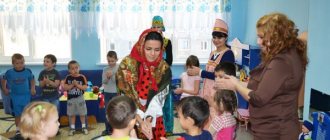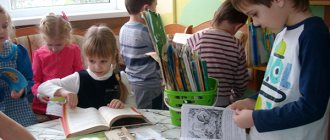A book for children is not only and not so much a source of information, but a window into a new world full of amazing travels and discoveries. The book gives knowledge, develops thinking, imagination and speech, but most importantly, it teaches you to feel, empathize and love, to distinguish good from evil.
In our age of information technology, it is increasingly difficult for books to compete with colorful computer games and cartoons. Alas, many modern children do not like to read, preferring a bright cartoon world to the book world, which immediately shows the whole picture, without forcing them to think and fantasize. Parents also make a significant contribution, as it is easier for them to distract their child with a cartoon in order to get some rest after work or do chores around the house.
International Children's Book Day is an excellent occasion to once again remember the important role reading plays in a child's life. We’ll tell you how and on what date the holiday is celebrated, and remind you once again why reading to children is so necessary.
History of International Children's Book Day
World Children's Book Day has been celebrated annually on April 2 for quite some time - since 1967. The initiator of the establishment of the holiday was the International Board on Children's Books (IBBY), and the idea itself belonged to the German writer Jelle Lepman , who once said:
“Give our children books and you will give them wings.”
The date was not chosen by chance - it coincides with the birthday of the main children's storyteller Hans Christian Andersen , who gave the world many wonderful fairy tales for all times. From the master’s pen came “The Ugly Duckling”, “The Snow Queen”, “Thumbelina” and many other works. By the way, the writer himself did not like being called a children's storyteller, each time objecting that he also writes for adults.
Andersen even ordered that not a single child be depicted on the monument at his grave.
Be that as it may, many generations of children have grown up and will continue to grow up on the books of the Danish writer. It would be difficult to choose a more suitable date to celebrate International Children's Book Day.
It’s interesting that children’s literature itself arose not so long ago—approximately in the 17th century. Until this time, children were mostly read the Bible and fables.
pixabay.com/wangtantan233
Child-parent project “Children’s Book Week” in the middle group
Bibliographic description:
Klementyeva, E. E. Child-parent project “Children’s Book Week” in the middle group / E. E. Klementyeva. — Text: direct // Questions of preschool pedagogy. — 2021. — No. 5 (15). — P. 86-89. — URL: https://moluch.ru/th/1/archive/100/3540/ (access date: 11/21/2021).
Childhood... The time of the most vivid impressions, the deepest experiences, the most amazing - first - encounters with this world. Every child's acquaintance with literature begins with short poems, nursery rhymes, and Russian folk tales, which accompany his entire childhood and remain with him throughout his life.
Children's fiction, being a treasury of spiritual wealth for children and adults, makes it possible to compensate for the lack of communication between preschoolers and people around them, broaden their horizons, and enrich their life and moral experience. Literary works involve students in thinking about the actions and behavior of people and current events; encourage their evaluation and enrich the emotional sphere.
A child, immersing himself in a fairy-tale world, ascends both to the level of already mastered sociocultural material, and to the level of something not yet known by humanity (“the image of the needed future”).
In a fairy tale there are always indirect indications of points of growth of human capabilities and abilities. Penetrating through a fairy tale into the thickness of the cultural and historical layers of human development, the child acquires a creative vector, and his individual creative potential as a future active reader increases.
Raising a future reader is a long and difficult process, but if the initial stage of introducing a child into book culture is successful, then the number of young people who are unable or unwilling to join the spiritual experience of humanity through books will be significantly reduced.
Relevance of the problem.
A decrease in reader interest, on the one hand, and the obviousness that reading in the modern world is an essential component of life success, on the other hand.
The goal of the project: to introduce children and their parents to reading children's fiction.
Project objectives:
– to develop an interest in books and children’s reading, to acquire a stock of literary artistic impressions and listener experience;
– develop cognitive, creative and emotional activity in the process of introducing preschoolers to literature;
– broaden children’s horizons, enrich and activate their vocabulary;
– develop children’s basic design and creative abilities by involving them in the design of homemade books for kids;
– cultivate a value-based attitude towards a book as a work of art;
– involve parents in creating conditions for developing children’s interest in books at home and in kindergarten, and revive reading within the family.
Preliminary work with children:
– thematic design of a group room;
– drawing together with parents the characters of your favorite fairy tales;
– reading children's fairy tales, stories, poems;
– selection of poems and preparation of expressive reading for memorization;
– selection of portraits of children's poets and writers.
Type, type of project : short-term.
Participants: middle school children, parents, teachers.
Final event: presentation of homemade books to younger preschoolers.
Expected result.
– Acquaintance with fairy tales will develop the first moral standards in middle preschoolers, and step by step will form an interest and love for literature.
– Children’s horizons will expand, their vocabulary will be enriched and activated.
– Family reading will be revived.
With the development of various modern technologies of smartphones, tablets, and computers, a book has ceased to be an important subject not only in the lives of preschool children, but also of their parents. Not so long ago, a book was considered the best gift for every child; now its place has been taken by technology and all kinds of electronic toys. The tradition of home reading, unfortunately, has faded into oblivion.
Children's book week in the middle group was divided into five topics.
Monday is fairy tale day. Opening of “Book Week”. The group organized a thematic book exhibition. The children got acquainted with the exhibition, looked at the books, and remembered familiar Russian folk tales “Sister Alyonushka and Brother Ivanushka”, “The Zhikharka”, “The Cockerel and the Bean Seed”, as well as fairy tales by V. G. Suteev, S. Mikhalkov, the Brothers Grimm, Sh. Perrault, K, Chukovsky. We learned new games: “Body with fairy tales”, “Guess the fairy tale”. We held a quiz “Journey through Fairy Tales”.
On Tuesday, on the day of book experts, we introduced the children to the history of the book, talked about the rules for handling it, looked at book covers, learned what illustration, literary text, binding, page are, and became acquainted with the concept of printing house, library. We thought about the topic: “Why do we need books?”
On Wednesday, on the day of the game and theater “We are playing a fairy tale,” theatrical and play activities were organized in the group at the request of the children, conditions were created for independent creativity in the game using the “Ramming” corner. By coincidence, on this day artists from the Samara Philharmonic came to our kindergarten. Our children enjoyed watching the children's performance. Children consolidated such concepts as theater, performance, stage, artists, spectator. In the afternoon, the role-playing game “In the Bookstore” was played.
On the day of creativity “We do it ourselves - with our own hands,” the children and I tried to illustrate a fairy tale, and although our illustrations were not entirely successful, our drawing skills failed us, the children were very pleased with their creative result. After sleep, work was organized to repair old books in the corner of the “Knizhkina Hospital”.
On the closing day of Children's Book Week, children brought homemade books for children, made together with their parents, and looked at and discussed them with great interest. And after breakfast there was a presentation of the books made to the children of the group.
Event plan
| Theme of the day | Operating procedure | Children's activities | Activities of educators | Parents' activities |
| Monday Day fairy tales "There are many fairy tales in the world..." | Opening of “Book Week”. Design of a thematic book exhibition in a group. Work in the book corner. | Conversation “Rules for handling a book.” Learning games: “Body with fairy tales”, “Guess the fairy tale”. Collaborative and independent games with table theaters. Looking at illustrations in books. | Design and review of the exhibition of methodological literature, Teacher’s story “The History of the Book” - A teacher’s story about the development of writing with illustrations. | Consultation "Theater on the kitchen table." Read the leaflet “Instilling in Children a Love of Reading.” |
| Tuesday "Day of Book Experts" | Educational lesson “Such different books.” A conversation about the rules of handling a book. | Participation in the quiz “Journey through Fairy Tales”. "These funny animals." Reading and listening to fairy tales, stories, poems, riddles about animals, works by E. Charushin, V. Suteev, V. Bianki, S. Marshak, K. Chukovsky. | Design of the memo “Introducing preschoolers to fiction.” Design of a card index of didactic games, selection of works of art on the topic. Design of a thematic book exhibition. | Participation in the quiz. Assisting in creating conditions for theatrical and role-playing games (production of the necessary attributes). |
| Wednesday theater day "We are playing a fairy tale" | Organization of theatrical and play activities for children, creation of conditions for children’s independent creativity in play. | Role-playing game “In a bookstore.” Dramatizations of your favorite fairy tales. Theatrical and role-playing games at the request of children. Listening to Russian folk tales. | Design of the memo “Introducing preschoolers to fiction.” Design of a card index of didactic games, selection of works of art. | Consultation “So that the fairy tale does not become boring.” Tips for decorating a children's home library “Books in our house.” |
| Thursday Creativity Day “We do it ourselves —with our own hands.” | “Knizhkina Hospital” - organization of work on the repair of old books. Organization of children's productive activities based on literary works. Exhibition of works of joint creativity “We do it ourselves - with our own hands.” | Organization of work in the “Knizhnik Hospital” corner. The plot is a role-playing game “Book Hospital”. S/r game “Book Publishers” - Drawing, modeling, appliqué based on the plots of literary works “My Favorite Fairy Tale”, “Portrait of a Fairy-tale Hero”, “Amusing Town”. | Teacher's story «A journey through the shelf of smart books." Design of the booklet “For parents - about children's reading.” | Consultation “What and how to read at home?”, “Children’s reading circle.” Making homemade books is a joint creativity of parents and children. Participation in the creative exhibition “We do it ourselves - with our own hands.” |
| Friday Closing day of Children's Book Week. | Presentation of a group book corner, book exhibition. Summing up the results of Children's Book Week. | S/r game "Library". Presentation of homemade books for younger preschoolers. | Preparation for the presentation of homemade books to younger preschoolers. | Creation of a creative group to produce the thematic magazine “The Book of Our Childhood.” |
| Closing of Children's Book Week. | ||||
Result of the project:
– got acquainted with the works of children's writers;
– remembered Russian folk tales;
– the horizons have expanded, the vocabulary has been activated when familiarizing yourself with illustrations of children's books (cover, binding, illustration, typography, font, letters, etc.);
– the rudiments of children’s elementary design and creative abilities were formed by involving them in the design of homemade books for kids;
– systematic home reading to a child at night formed the preschooler’s habit of daily communication with a book, developed an interest in children’s fiction, and brought all family members together.
Future plans.
– Continue to work on developing our students’ interest in books and children’s reading, acquiring a stock of literary artistic impressions and listener experience.
– With the help of parents, replenish the group’s book corner with new illustrated editions of their favorite books.
– Visit the children's district library.
Literature:
- Thematic weeks in kindergarten /Auth.-comp. T. N. Sergeeva. - M.: Planeta, 2013. - 128 p. - (Preschool education)
Key terms
(automatically generated)
: fairy tale, children's book, book, child, day, children's reading, game, children's fiction, presentation of homemade books, creation of conditions.
Mission of the holiday and its traditions
International Children's Book Day was established to draw attention to the importance of reading to children and by children. Its main goal is to involve children in the wonderful world of literature, show all its diversity and instill a taste for reading books.
Perhaps the most important tradition of the holiday is the Prize named after them, held once every two years. H. K. Andersen. The awards ceremony is fully supported by the International Children's Book Council. The event honors writers and illustrators who create works for children.
In addition, thematic lessons, meetings with writers, exhibitions and presentations are organized in educational institutions and libraries, reading competitions and quizzes on knowledge of works are held. The winners are awarded with certificates, medals and diplomas and, of course, given books.
pixabay.com/press and



